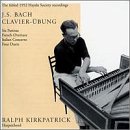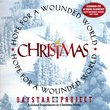| All Artists: Bach, Kirkpatrick Title: Bach: Clavier-ubung Parts I, II and IV / Ralph Kirkpatrick Members Wishing: 0 Total Copies: 0 Label: Music & Arts Program Release Date: 5/23/2000 Album Type: Original recording reissued Genre: Classical Styles: Chamber Music, Forms & Genres, Concertos, Suites, Historical Periods, Baroque (c.1600-1750), Classical (c.1770-1830) Number of Discs: 4 SwapaCD Credits: 4 UPC: 017685497629 |
Search - Bach, Kirkpatrick :: Bach: Clavier-ubung Parts I, II and IV / Ralph Kirkpatrick
 | Bach, Kirkpatrick Bach: Clavier-ubung Parts I, II and IV / Ralph Kirkpatrick Genre: Classical
|
Larger Image |
CD DetailsSimilar CDs |
CD ReviewsLegendary is not too strong Mark Dirksen | Beverly Mass. United States | 10/30/2000 (5 out of 5 stars) "First, please note that this recording *does* include Kirkpatrick's first recording of the Goldberg Variations - information that is unaccountably omitted from Music and Arts own register of the contents. But believe me, it is here - CD 3 - and it is worth the price of all four disks by itself. Second, the 4 duets may well have been written for organ, as mentioned above, but they are recorded here on harpsichord, the same 1908 Dolmetsch used for everything else on the recording *except* the English Suite, which was recorded at a different time.I must be forgiven for a somewhat biased view of these recordings as my father was the recording engineer for them: I grew up practicing the piano in our basement next to the Ampex tape recorder on which they were made. As such, both the recordings and the circumstances under which they were made (6 years before I was born) had legendary status in our house. As I grew and developed as a musician I naturally began to learn the music for myself and to listen to other interpretations. But I return again and again to these and after 30 years can honestly say I have **never** heard a harpsichord or player to match them, even in these rich latter days of recording and performance of Baroque music.Before speaking of Kirkpatrick's playing, the aforementioned Dolmetsch instrument deserves a word itself. If you've found your way to this review, you probably know that Arnold Dolmetsch and his circle were investigating "Early Music" in Western Europe at the end of the nineteenth century, and are most famous for their work on early wind instruments, especially recorders. This instrument has four registers across two manuals - two 8', one 4' and one 16'. The latter will raise an eyebrow, perhaps, as sixteen-foot stops are not usually found, but they were not uncommon in Bach's own time, and give an immense sense of gravity to the tone - Kirkpatrick uses it sparingly, and always to tremendous effect. Another noteworthy characteristic is that it has wooden jacks, and *leather* plectra (as opposed to quill, or the later Delrin) - Richard Rephann, Kirkpatrick's colleague at Yale University, gives more detail on this in his excellent accompanying essay.The story behind these 1952 recordings is unusual in itself, and interested parties can write me for further detail. I'll just say here that while my father had the scores available to him for reference during the sessions he insists that Kirkpatrick played every note from memory, and the intensity and passion of his music-making that summer made an indelible impact on Dad (no slouch himself in that arena!). Apparently Kirkpatrick had an unerring sense of dance, and (whether in frustration or joy) would even try to demonstrate the various Baroque measures in his own clumsy way. That visceral connection with the music comes across clearly, but to my ear what elevates these recordings are A) the ineffable sweetness of the harpsichord's tone, and B) Kirkpatrick's awe-inspiring sense of touch. The former allows the latter: the tone of the instrument is so pleasant, so un-clattery and non-mechanical, that Kirkpatrick can let notes overlap to produce an incredible singing legato no pianist can match. The degree to which he will overlap one or more notes, and in which voices, will repay the closest scrutiny; and the variety and loveliness of the tone will permit you to listen again and again without tiring the ear. I repeat: you have NEVER heard a harpsichord sound like this on any recording, ever. But let Kirkpatrick himself have the last word. This passage from his immortal introduction to the 1938 Schirmer edition of the Goldberg Variations can serve as his comment on the entire 4 (!!) CD collection: "The first variation stands like a festive gateway leading to the inner world exposed in the following three variations. These, like so many of the canons and the Aria, have an unearthly pure sweetness and a lyricism in every phrase that makes one long to dissolve one's fingers, the instrument, and one's whole self into three or four singing voices." Amen!" Simply the best John A. Courtney | Okemos, MI USA | 07/13/2000 (5 out of 5 stars) "In many ways delightfully different from his later DDG recordings. The control, phrasing, and technique are all superb. The musical interpretation is always fascinating and often, like the technique, breathtaking.Kirkpatrick is simply among the best of the best keyboard players, and these re-releases are enormously welcome. What a shame that, so far, so few of his recordings have been re-engineered for CD!"
|

 Track Listings (19) - Disc #1
Track Listings (19) - Disc #1